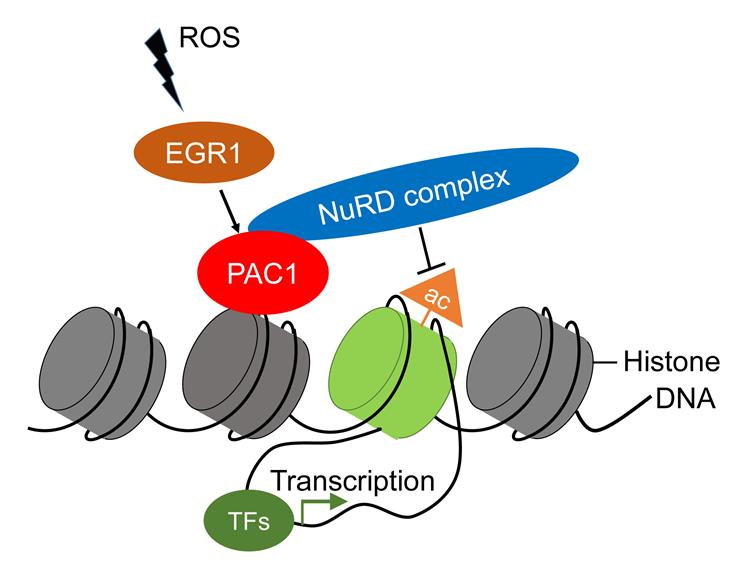Dr. Yuxin Yin’s group discovered a novel mechanism of tumor immune escape
Source:Yuxin Yin
2020-06-10
On Jan 13, 2020, Nature immunology published a research article entitled “The phosphatase PAC1 acts as a T cell suppressor and attenuates host antitumor immunity” (Nat Immunol. 2020, 21(3):287-297) from Prof. Yuxin Yin’s group. Dr. Yuxin Yin is the Director of the Institute of Systems Biomedicine, Peking University Health Science Center. With the support by the National Natural Science Foundation of China and National Key Research and Development Program of China, Dr. Yin and his colleagues have uncovered a novel mechanism by which T cell exhaustion is modulated during cancer development.
Dysregulation of host immune response is tightly linked with cancer progression. Cancer cells subvert immune surveillance through induction of T cell exhaustion, which is accompanied by transcriptional and epigenetic reprogramming. Through blockade of inhibitory receptors, immunotherapy has exhibited remarkable promise in treatment of cancer, particularly those refractory to conventional therapies. However, only 15%-20% of patients exhibit clinical responses to treatment with PD-1 or PD-L1 antibodies. It is speculated that there are other mechanisms that contribute to the control of host antitumor immunity. Hence, elucidation of the mechanism of T cell dysfunction will be important for cancer immune eradication.

Through analysis of gene expression profiles of exhausted tumor-infiltrating lymphocytes, Yuxin Yin’s group has identified the phosphatase PAC1 as a potential negative regulator of T cell function. They found that PAC1 is exclusively expressed in immune systems and is selectively increased in dysfunctional tumor-infiltrating lymphocytes, which is highly correlated with poor clinical outcomes. Furthermore, deletion of PAC1 enhances T cell expansion and increases the immune response against cancer. Interestingly, through screening tumor-surrounding components that influence PAC1 expression in T cells, they found that reactive oxygen species (ROS) maintains high levels of PAC1 in effector T cells and ROS does so through activation of the transcription factor EGR1. ROS from inflammation and chronic lesions has been strongly implicated in tumorigenesis. They observed that deletion of PAC1 blocks ROS-mediated T cell dysfunction and reduces inhibitory receptors.
PAC1 is widely considered a canonical phosphatase, however, in the present study, they found that PAC1 exerts immunosuppressive function in a phosphatase-independent manner. Strikingly, PAC1 is bound with chromatin through its N-terminal domain. ATAC-seq and ChIP-seq approaches reveal that PAC1 is physically associated with the NuRD complex and affects chromatin accessibility, reprogramming the transcriptional profile of effector T cells.
In summary, Dr. Yin’s work has led to the identification of a novel T cell epigenetic checkpoint in suppression of T cell response against cancer. The redox active transcription factor EGR1 can regulate PAC1 expression and consequently suppress CD8+ T cell under inflammatory conditions, establishing a molecular link between oxidative stress and T cell exhaustion through EGR1-PAC1 signaling. Therefore, PAC1 is a potential target for cancer therapy. Understanding the PAC1 pathway may open new avenues to the development of better strategies of cancer immunotherapy.
Links: https://www.nature.com/articles/s41590-019-0577-9
Dysregulation of host immune response is tightly linked with cancer progression. Cancer cells subvert immune surveillance through induction of T cell exhaustion, which is accompanied by transcriptional and epigenetic reprogramming. Through blockade of inhibitory receptors, immunotherapy has exhibited remarkable promise in treatment of cancer, particularly those refractory to conventional therapies. However, only 15%-20% of patients exhibit clinical responses to treatment with PD-1 or PD-L1 antibodies. It is speculated that there are other mechanisms that contribute to the control of host antitumor immunity. Hence, elucidation of the mechanism of T cell dysfunction will be important for cancer immune eradication.

Through analysis of gene expression profiles of exhausted tumor-infiltrating lymphocytes, Yuxin Yin’s group has identified the phosphatase PAC1 as a potential negative regulator of T cell function. They found that PAC1 is exclusively expressed in immune systems and is selectively increased in dysfunctional tumor-infiltrating lymphocytes, which is highly correlated with poor clinical outcomes. Furthermore, deletion of PAC1 enhances T cell expansion and increases the immune response against cancer. Interestingly, through screening tumor-surrounding components that influence PAC1 expression in T cells, they found that reactive oxygen species (ROS) maintains high levels of PAC1 in effector T cells and ROS does so through activation of the transcription factor EGR1. ROS from inflammation and chronic lesions has been strongly implicated in tumorigenesis. They observed that deletion of PAC1 blocks ROS-mediated T cell dysfunction and reduces inhibitory receptors.
PAC1 is widely considered a canonical phosphatase, however, in the present study, they found that PAC1 exerts immunosuppressive function in a phosphatase-independent manner. Strikingly, PAC1 is bound with chromatin through its N-terminal domain. ATAC-seq and ChIP-seq approaches reveal that PAC1 is physically associated with the NuRD complex and affects chromatin accessibility, reprogramming the transcriptional profile of effector T cells.
In summary, Dr. Yin’s work has led to the identification of a novel T cell epigenetic checkpoint in suppression of T cell response against cancer. The redox active transcription factor EGR1 can regulate PAC1 expression and consequently suppress CD8+ T cell under inflammatory conditions, establishing a molecular link between oxidative stress and T cell exhaustion through EGR1-PAC1 signaling. Therefore, PAC1 is a potential target for cancer therapy. Understanding the PAC1 pathway may open new avenues to the development of better strategies of cancer immunotherapy.
Links: https://www.nature.com/articles/s41590-019-0577-9


